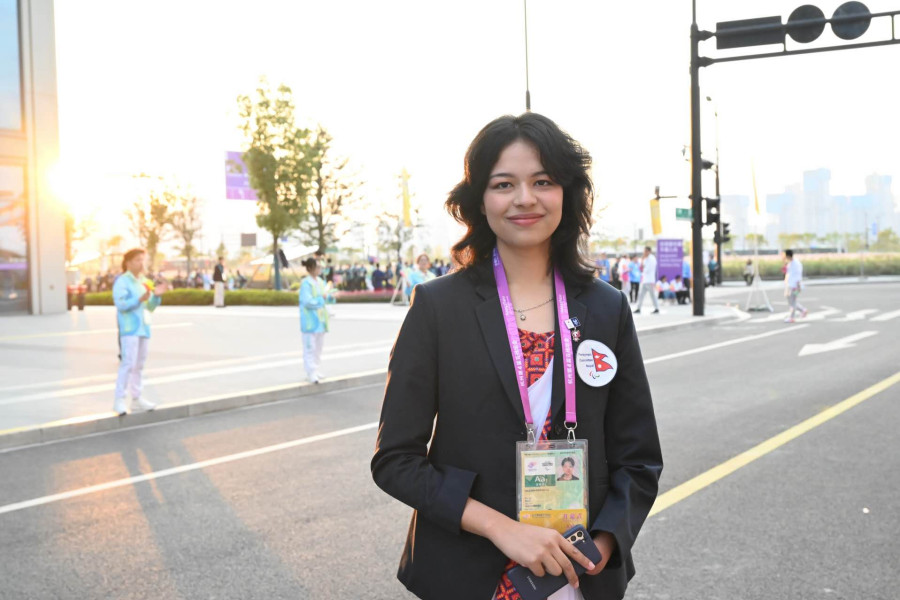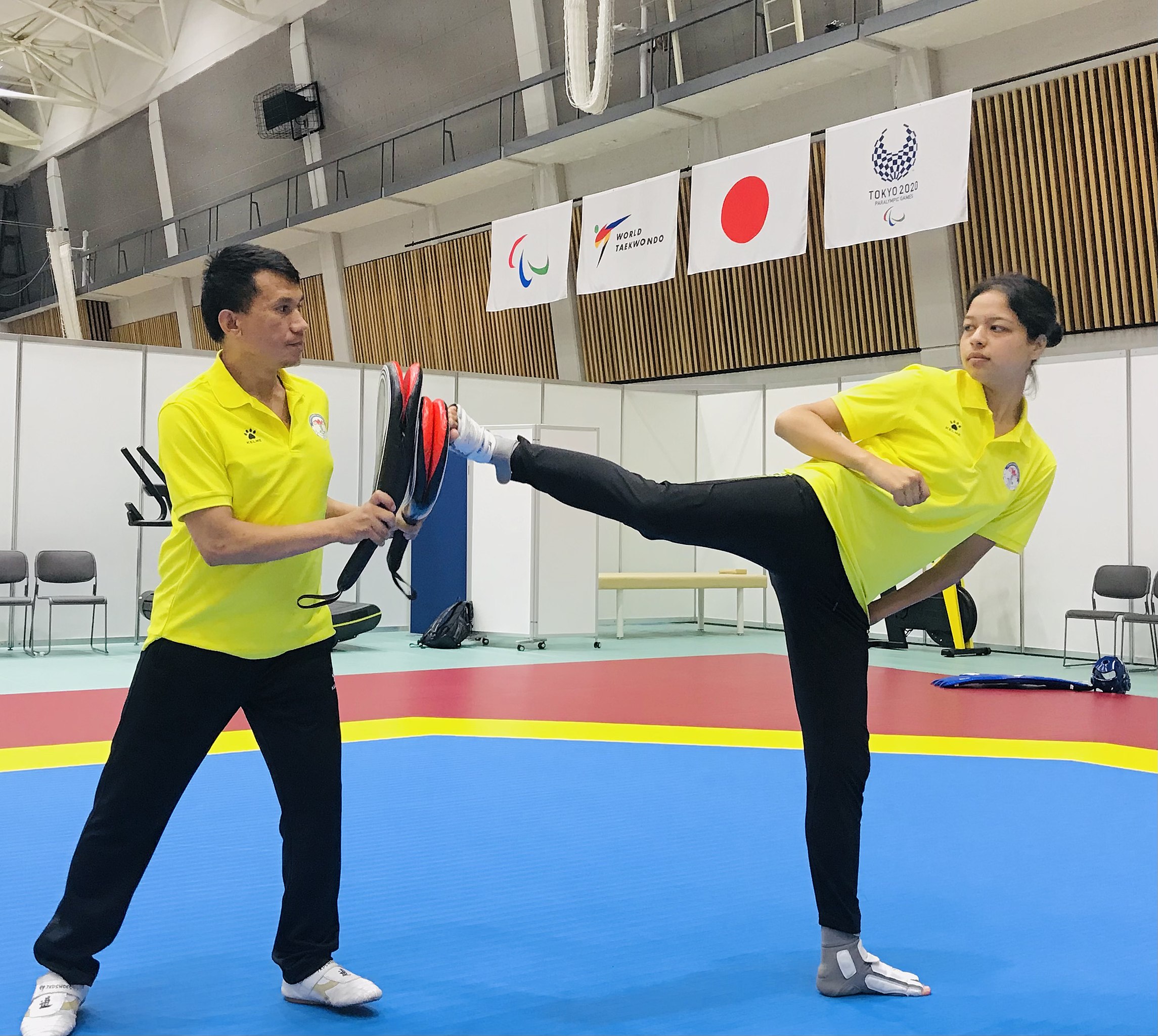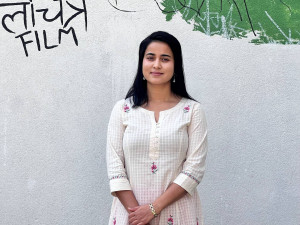Culture & Lifestyle
The girl who chose to kick back
Palesha Goverdhan, who was born without a left palm and is the first Nepali Paralympian to qualify for an Olympic event, talks about her athletic journey, which has been full of ups and downs.
Anish Ghimire
Palesha Goverdhan, now 20, reflects on her childhood as quite distinct from other kids her age. Being born without a left palm, she began school a year later than her peers, which made her feel like she stood out. Despite feeling different, she never viewed herself as weaker than others. Known as a bit of a rebel in her household, she was always kicking and punching even before she discovered taekwondo.
Apart from focusing on academics, Goverdhan carried a passion for reading, drawing and writing. Drawing, in particular, was her favourite activity. Seeing this, her mother gifted Goverdhan paints and colouring books on her birthdays. She studied at DAV School, and recalls grade 5, in particular, with fondness. That year, students had to choose an extracurricular activity to take on between dance, music and martial arts. “I chose martial arts because it resonated more with my nature,” she says.
She wanted to stand out from the very beginning days of her training. “I remember kicking higher, punching harder and giving my all to impress my teacher,” she recalls. She practised hard and participated in both school and interschool competitions, earning many medals.
This caught the eye of her coach, Umesh Saud. Seeing her determination, he expressed a desire to meet her parents. After chatting with them, coach Saud, mentioned a new category for her, Para-Taekwondo. Though her parents hesitated slightly at first, they enrolled her in Taekwondo Dojang in Bafal. Goverdhan attended classes every Saturday and during the holidays.
Later, a new teacher, Kishor Kunwar, took over. He initiated taekwondo sessions after school with a small group of classmates and older students.
Then, Kishor introduced Goverdhan to the national coach, Kalyan Kunwar. Kalyan encouraged her to train after her classes. For a 12-year-old, her schedule was tight; she reached home at 3 pm, and her training started 90 minutes later. Her mom would take her to the classes, and her dad would pick her up at 7 pm, on his way back from office.
“Initially, I was the only one training in the Dasharath Stadium, which made the experience intense. However, after some time, I got to meet other athletes, including non-Para Taekwondo players from the army and police,” she says. Keeping up with them was a real challenge for her. “We had to run while carrying weights on our backs, do 20 rounds of the ground, and more. All of this was quite intense for me at the time,” she recalls.
When she was 13, in 2017, Goverdhan got the opportunity to play her first match in the 2017 Asian Para-Taekwondo Open in Chuncheon, South Korea. The trip stretched over an entire month filled with intensive training and games. This extended absence from her family posed a challenge, as she had never been away from them for such a long period.
To begin training for the competition, she attended school until 3 pm, followed by training from 4 pm to 7:30 pm. “On top of all this, I had to adhere to a strict diet to compete in the 57 kg category,” she explains.
After completing two months of intensive training, Goverdhan’s team visited South Korea. Despite the initial excitement, the reality of the experience was quite different. Accompanied by her then-coach, Kabiraj Negi Lama, she found adjusting to the new environment challenging. They had to stay in an unfamiliar apartment and manage their own cooking and groceries. Additionally, they had to walk for an hour every day to reach the university for their training sessions.
“Truth be told, I wasn’t enjoying the experience at all. I even regretted my decision to come to South Korea and considered giving up Taekwondo altogether,” she confessed.
However, everything changed on the day of the game. Scheduled to compete against Turkey, she found herself in a stadium filled with players passionately supporting their respective countries. Stepping onto the mat for the first time, wearing sensor socks (equipment used in the sport), gave her chills. “Prior to this, I had never worn sensor socks. I purchased my first at the venue,” she said.
Despite feeling less skilled compared to her opponents because of her lack of experience and young age, Goverdhan felt confident in her slapkick technique. “Before the match, I did some self-talk, reminding myself of the stage I was setting my foot on,” she says. Despite losing the match, she remembers her opponent and supporters congratulating the effort made by a 13-year-old.
She was disappointed because of her defeat but driven by her desire to win a gold medal, she gave it another shot and participated in the 2017 World Para-Taekwondo Championship in London, UK. This time around, she secured a victory with an impressive score of 10-0. “However, to clinch a medal, I had to play another match, which unfortunately didn’t end in my favour,” she says.
Despite the setback, Goverdhan found herself stunned when her opponent managed to secure a medal despite losing the match, due to a rule called ‘bye’. Feeling defeated again, she channelled her anger into motivation, pushing herself even harder.
The next challenge was the fourth Asian Para-Taekwondo Championships held in Vietnam in 2018. Despite facing criticism and discouragement from some teachers and officials, who questioned her dedication to Taekwondo and suggested that she abandon it due to the challenging conditions for athletes in Nepal, she remained resolute in her determination and participated in the competition.
In Vietnam, Goverdhan secured her very first bronze medal against Turkey. “I will never forget the immense joy on the faces of my parents and coach,” she says. In total, there were eight athletes, both non-para and para, and she was the sole Nepali player to secure a medal.
Following that, she faced a series of setbacks and defeats, including disqualification in a crucial test match for the 2019 Paralympics. Discouraged by the lack of support for para-athletes in Nepal and contemplating quitting the sport altogether, she struggled through grade 10—balancing rigorous training with academic pressures.
Still, she began training for the Tokyo Paralympics test match games while balancing her studies late into the night. Despite her unwavering efforts, the pivotal test match ended in defeat, giving her a crushing blow. The stakes were high, with only the top three positions securing a spot in the Paralympic games, and Goverdhan was vying for the bronze. Regrettably, she accidentally kicked her opponent in the head, resulting in Goverdhan’s disqualification for dangerous play. “This mistake left me feeling hopeless. I feared that my athletic career had come to an abrupt end,” she said.

Lockdowns were imposed globally soon after due to the Covid-19 outbreak. “And suddenly, I was informed that I got the wildcard entry in the 2020 Tokyo Paralympics games in the 57 kg category,” she said.
Navigating through the challenges posed by the pandemic, Goverdhan faced gruelling training days. “Travel was limited and meeting people was prohibited,” she explains.
Despite being a professional athlete, she never received much financial support throughout her career. “I never received any financial backing, just a tracksuit with a company logo,” she says. “But none of these setbacks mattered to me. My focus was solely on winning the gold medal,” she says.
In the Paralympics, she lost her first gold medal match to a British athlete. Goverdhan remembers feeling nervous in the unfamiliar atmosphere. Determined to win a medal, she won successive matches against the US and Serbia. In an intense final match with China, she lost by a narrow margin. “The loss was difficult to digest because I had come so close to winning,” she said.
She became Nepal’s first athlete to win two matches in the Paralympics. Mixed reactions followed her performance, with some doubting her success. Because of the harsh criticism coming her way, she considered quitting but was persuaded to compete in the Asian Youth Para Games in 2021 in Vietnam, where she won gold.
In last year’s 4th Hangzhou Asian Para Games in China, Goverdhan secured a bronze medal.
“Everyone seemed proud of my achievements, but unfortunately, it was followed by a series of empty promises,” she recounted. “The National Sports Council claimed it would arrange training in Shanghai, but it never materialised. They also made other such promises, but nothing was ever implemented.”
Inspite of the lack of support from responsible authorities, she bagged another gold in the 2024 Asian Paralympic Qualification Tournament for the Paris 2024 Paralympic Games being held later this year.
This meant that she became the first Nepali Paralympian to qualify for an Olympic event, securing a spot at the 2024 Summer Paralympics. Goverdhan will be amongst 60 other female taekwondo players competing in five categories at the Paris Paralympics.
“The truth is, when something truly matters to you, you will always find a way,” she reflects on her journey so far. “No matter how difficult or dire the situation may seem, you must keep moving forward and never stop practising,” she added.




 18.12°C Kathmandu
18.12°C Kathmandu















